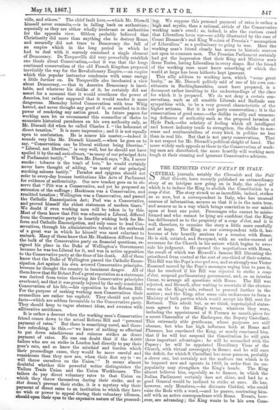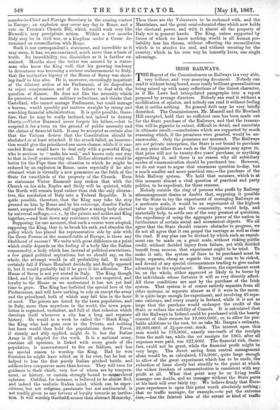THE EXPECTED COUP D'ETAT IN ITALY.
SEVERAL journals, notably the Chronicle and the Pall Mall Gazette, have recently published an extraordinary story of an intrigue now going on in Italy, the object of which is to induce the King to abolish the Constitution by a coup d'itat. The story struck us as incredible, indeed, strikes us so now, but a correspondent in Italy, who has unusual sources of information, assures us that it is in the main true, and assures us in a way which brings conviction to our minds upon at least one point. Personages who cannot be misin- formed and who cannot be lying are confident that the King has deliberated as to the propriety of a coup d'Itat, and it is well, therefore, to examine the story a little more carefully and at large. The King, as our correspondent tells it, has become of late heartily anxious for a reunion with Rome. He is sick, satiated, and Savoyard, with an under-current of reverence for the Church in his nature which begins to over- rule his judgment. He opened the negotiations with Rome, the result of which was Ricasoli's famous Bill liberating the priesthood from control at the cost of one-third of their estates. This Bill was the Pope's sine qud non, and so strongly was Victor Emanuel moved by the Pope's messages urging him to pass it, that he resolved if his Bill was rejected to strike a coup d'e'tat, suspend parliamentary government, and, as an interim Omar, to arrange all questions with Rome. The Bill was rejected, and Ricasoli, after waiting to ascertain if the electors were on the King's side, refused to proceed further in the matter ; and the King, after some vain endeavours to form a Ministry of both parties which would accept his Bill, sent for Rattazzi. This adroit but, as we think, unprincipled states- man agreed to the King's terms, whatever they were, including the appointment of S. Ferrara as mouth-piece for a secret Chancellor of the Exchequer, the Deputy Castellani. This extremely able gentleman, whose purposes are still obscure, but who has high influence both at Rome and Florence, has convinced the King, or nearly convinced him, that if he will but suspend the Constitution ho will gain three important advantages ; he will be reconciled with the Papacy; he will be appointed Hereditary Vicar of the Church, with virtual sovereignty in Rome; and he will cure the deficit, for which S. Castellani has some panacea, probably a clever one, but certainly not the multure tax which is to be imposed now and operate in 1869, in order that its un- popularity may strengthen the King's hands. The King almost believes him, especially as to finance, in which the Italian Parliament certainly does not shine, and had he a good General would be inclined to strike at once. He has, however, only Menabrea,—he distrusts Cialdini, who could raise the Reds with a word,—and he pauses, contenting him- self with an active correspondence with Rome. Events, how- ever, are advancing ; the King wants to be his own Om- mander-in-Chief and Foreign Secretary in the coming contest in Europe ; an explosion may occur any day in Rome, and a vote on Ferrara's Church Bill, which would work very like Ricasoli's, may precipitate action. Within a few months Italy may be in civil war, or a kingdom under a Caesar de- termined on reconciliation with Rome.
Such is our correspondent's statement, and incredible as it may seem, it has, we are convinced, much more than a basis of truth. Its incredibility, too, diminishes as it is further ex- amined. Months since the writer was assured by a states- man who knew the King well, that his growing tendency to devoutness was becoming a serious embarrassment to Italy, that the instinctive bigotry of the House of Savoy was show- ing itself in him also. He is, moreover, exceedingly impatient of the dilatory action of his Parliament, of its disposition to reject compromises, and of its failure to deal with the question of finance. He does not like the necessity which he perceives of immense military reductions, and thinks that Castellani, who cannot manage Parliament, but could manage a bureau, would speedily put matters straight by strong and searching financial administration. It is quite possible, there- fore, that he may be really inclined, not indeed to destroy liberty,—Victor Emanuel never forgets his father,—but to suspend it for a term on the ground of public necessity and the claims of financial faith. It may be accepted as certain also that the Vatican desires that the Constitution should be abolished or at least attacked. If the attack failed, an insurrec- tion would give the priesthood one more chance, while if it suc- ceeded Rome would have to deal only with a powerful King, who is anxious to " make his soul," and knows only one way to that in itself praiseworthy end. Either alternative would be better for the Pope than the situation to which he might be reduced by an explosion in Rome, more especially if he also obtained what is virtually a new guarantee on the faith of the State for two-thirds of the property of the Church. Even as statesman Victor Emanuel may reckon that with the Church on his side, Naples and Sicily will be quieted, while the North will remain loyal rather than risk the only alterna- tive, the resolution of Italy into a Federal Republic. It is quite possible, therefore, that the King may take the step pressed on him by Rome and by his entourage, dissolve Parlia- ment, suspend the Statute, call together a taxing body elected by universal suffrage,-1. e., by the priests and nobles and King together,—and beat down any resistance with the sword.
Supposing, for one moment, that such a course were adopted, supposing the King, that is, to break his oath, and abandon the policy which has placed his representative side by side with the Great Powers at the council-table of Europe, is there any likelihood of success t We write with great diffidence on a point which really depends on the feeling of a body like the Italian commonalty, a body which has, instead of political convictions, a few grand political aspirations, but we should say, on the whole, the attempt would in all probability fail. It would certainly fail if Prince Humbert decidedly and finally opposed it, but it would probably fail if he gave it his adhesion. The House of Savoy is not yet rooted in Italy. The King, though liked, and by the soldiery even admired, is not respected, and loyalty to the House as we understand it has not yet had time to grow. The King has forfeited the special love of the Piedmontese, and will have nothing to rely on except the army and the priesthood, both of which may fail him in the hour of need. The priests are hated by the town population, and in Italy, more than anywhere in the world, the town popu- lation is organized, turbulent, and full of that cohesion which develops itself whenever a city has a long and separate history. He would in a week be called the " Black King," the King who had gone over to the Priests, and nothing but force would then hold the populations down. Force, if sternly and ably applied, might do it, but the Italian Army is ill adapted for the work. It is a national army, contains all opinions, is linked with every grade of the population, is unaccustomed to fire on Italians, and has no special reason to worship the King. Had he won Custozza he might have relied on it for ever, but he lost or helped to lose the first purely Italian pitched battle, and soldiers love conquerors more than heroes. They will turn for guidance to their chiefs, very few of whom are by tempera- ment, or history, or custom strongly bound to meparchical opinions. Cialdini, for instance, is believed to be &bast Red, and indeed the realistic Italian mind, which can be super- stitious, but not • religions, passionate but not sentimental, is not readily given to any fervour of loyalty towards an institu- tion. tion. It will worship Garibaldi sooner than abstract Monarchy.` Then there are the Volunteers to be reckoned with, and the Mazzinians, and the great semi-educated class which now holds the electoral power, and with it almost all the property of Italy not in peasant hands. The King, unless supported by forces of which we know nothing, would in all human pro.. bability lose his throne, without effecting the reconciliation which is to absolve his soul, and without securing for the country, which in his own way he honestly loves, one single advantage.































 Previous page
Previous page